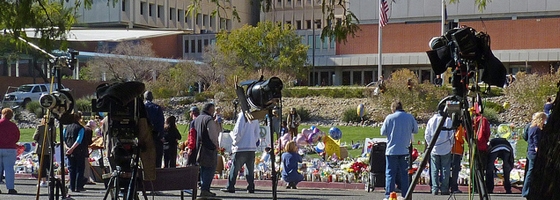First, let me say that I feel great sorrow and sympathy for the families of everyone involved in the tragic events in Tucson, Arizona. But my personal feelings are separate from my professional ones.
While I watched the events unfold, I was reminded that crisis communications are so important and so very difficult. It’s hard to prepare or train people to deal with worst-case scenarios. In many cases, there’s no plan at all because people hope that it won’t happen to them.
Hard as it may be—you must develop a plan BEFORE a crisis hits—not during or after.
The ability to communicate what is happening is critical to the management of a crisis. The sooner you are able to mobilize people, set a plan in motion and inform the public what it is—the better off you’ll be.
Admittedly, it is a terrible thing to have to think about because crises are times of great stress and often tragedy. But the reality is— how you handle the crisis will influence people’s opinions of your organization/company for many years to come. (Think BP.)
The first 24 hours are critical. But they are also so stressful that you can understand if information isn’t flowing freely or is changing rapidly. You are bound to have conflicting reports about what’s happening during that first day. But by the second day—you should have command of the distribution of information. And there should be one main spokesperson. She should be the face of the crisis for your company, police department or hospital.
As I watched a news conference at University Medical Center on day two of the crisis, I was stunned by the number of spokespeople they offered up. I stopped counting after the fifth person took the podium. They were administrators and doctors. And they tried selling a team approach to medicine, which is presumably why so many people spoke. Unfortunately, only one of them was good at communicating information. The others looked and sounded over-rehearsed and/or awkward. Additionally, it looked like many people were trying to take credit and bask in the spotlight. And truly—that is not the goal of crisis communications where perception is everything.
My Advice:
1. Choose one spokesperson for your organization/company. Let him communicate the big picture statements and answer the majority of the questions.
2. If you need a specialist to answer questions i.e. a doctor then have her on-hand to address medical questions. Don’t have every doctor involved take a turn at the microphone. Pick one.
3. Clearly establish expectations for future media briefings. (The hospital did this. 10am every day.) The issue: once a day isn’t going to cut it. You can limit news conferences to once a day. But you should make someone available for updates/briefings at least a few times a day—morning, afternoon and evening. And you should make sure that you communicate this fact publicly. This lets people know that you are on top of the situation.
Again—personally, I feel for everyone involved in this grave situation. But speaking professionally, this hospital needed to be better prepared and/or needed to have a better plan in place. Doing so would not only have reassured the families of those involved in the incident, but it would have showcased their facility better than any tag team “taking-credit” approach.
photo credit: bruce_fulton via photopin cc

